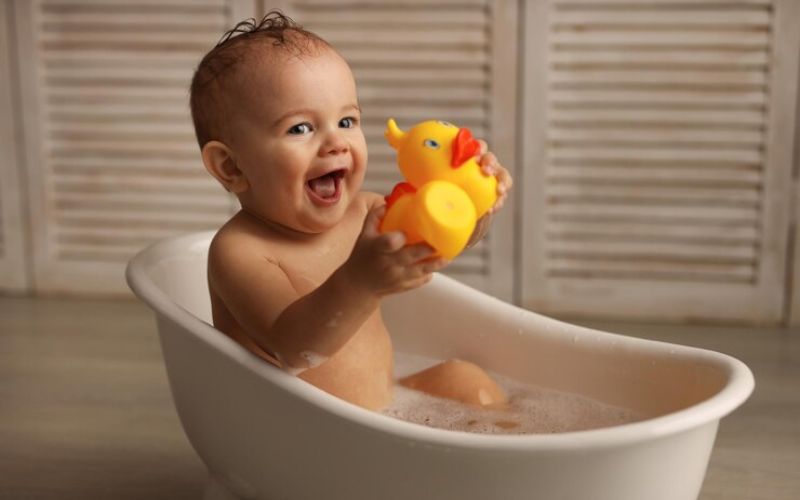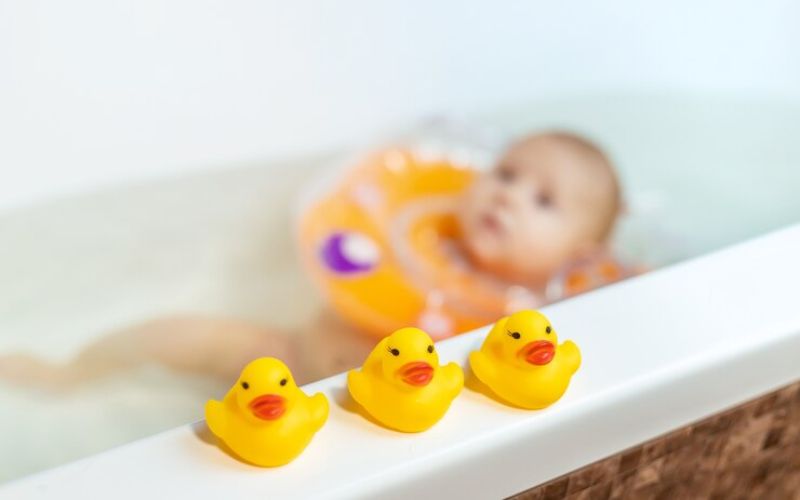Last Updated on November 1, 2023 by Muhammad Sohaib
Bathing a newborn can be a delightful and intimate bonding experience for parents and their little ones.
The gentle touch of warm water and the soothing sound of a baby’s laughter can create lasting memories.
However, not all babies take to baths with the same enthusiasm. In fact, many newborns develop an aversion to bath time, making this daily ritual a source of anxiety for both parents and infants.
This blog explores the topic of “Newborn Hates Bath” in detail, providing parents and caregivers with insights, tips, and strategies to make bath time a more enjoyable and less stressful experience for their little ones.
From understanding the underlying causes of a baby’s bath-time resistance to selecting the right bathing techniques, we’ll delve into every aspect of this challenging phase in early parenthood.
Why Do Newborns Hate Baths?
Have you ever wondered why your little one seems to detest bath time so much?
Well, the answer is simple – it’s a whole new experience for them. Newborns are used to the warmth and comfort of the womb, and a sudden exposure to water can be quite a shock to their system.
The unfamiliar sensations can make them feel vulnerable and anxious, leading to their bath-time protests.
Understanding Your Baby’s Fear
Understanding your baby’s fear is the first step in addressing the issue. They might not be able to express themselves in words, but their body language speaks volumes.
Look out for signs of distress, such as crying, arching their back, or stiffening their body. These are clear indicators that your baby is not enjoying their bath.
Preparing for a Successful Bath
To ease your newborn into bath time, ensure that you’re well-prepared. Gather all the necessary supplies within arm’s reach, like baby shampoo, soap, a soft towel, and clean clothes.
Being organized will make the process smoother and more comfortable for both you and your baby.
Creating a Soothing Bath Environment

The environment in which you bathe your baby plays a significant role in their overall experience.
Make sure the room is comfortably warm, free from drafts, and well-lit. Dimming the lights slightly can create a calming ambiance, much like the gentle lighting of the womb.
Gentle Handling and Comforting Techniques
Newborns are incredibly sensitive to touch. Be gentle in your approach, and avoid sudden movements.
Use warm water and a soft cloth to cleanse your baby, and remember to talk to them soothingly throughout the process. Your reassuring voice can provide much-needed comfort.
Establishing a Bath-Time Routine
Creating a consistent bath-time routine can help your baby feel more at ease. Babies thrive on predictability, so stick to a schedule that works for you and your baby.
This will signal to your little one that bath time is approaching, and they may become more accustomed to the routine over time.
Choosing the Right Baby Bath Products

Selecting the right bath products for your baby is crucial. Ensure that the soap and shampoo you use are mild and hypoallergenic, as a newborn’s skin is delicate.
Harsh products can cause skin irritation, making bath time even more unpleasant.
Gradual Desensitization
Gradual desensitization involves exposing your baby to water in small, manageable steps. Start by gently wetting their feet and gradually work your way up.
This method can help your baby become accustomed to the sensation of water and reduce their fear.
The Power of Distraction
Babies are naturally curious, and providing them with gentle distractions during bath time can work wonders.
Try using colorful bath toys or even sing soft lullabies to keep their focus away from any potential anxiety.
Handling Bath-Time Accidents
Accidents can happen, and sometimes your baby may have a little accident during bath time. Stay calm and handle the situation with grace.
It’s all part of the learning process, and it’s essential not to make a big deal out of it.
Celebrating Small Wins
Celebrate every small victory during bath time. Whether it’s a moment of calm or a brief smile, acknowledging these positive moments can create a more positive association with bath time for your baby.
Common Mistakes to Avoid
Avoid some common mistakes like using water that’s too hot or cold, being in a rush, or being overly anxious yourself. These can all contribute to your baby’s discomfort during bath time.
When to Seek Professional Help
If your baby’s aversion to bath time persists despite your best efforts, it may be time to seek professional advice.
A pediatrician or child psychologist can provide valuable insights and guidance.
FAQ’s
1. Why does my newborn hate baths so much?
Newborns often dislike baths because it’s a new and unfamiliar experience. The sensation of water and the change in environment can make them feel anxious and vulnerable.
2. What are some common signs that my baby is afraid of bath time?
Common signs of your baby’s fear during bath time include crying, arching their back, and stiffening their body.
3. How can I make bath time more enjoyable for my baby?
You can make bath time more enjoyable by creating a soothing environment, being gentle in your handling, and establishing a consistent bath-time routine. Using mild, hypoallergenic baby products and providing distractions can also help.
4. Is it normal for babies to have accidents during bath time?
Yes, it’s entirely normal for babies to have accidents during bath time. Stay calm and handle the situation without making a big fuss about it.
5. When should I seek professional help if my baby’s aversion to bath time continues?
If your baby’s aversion to bath time persists despite your efforts, it’s a good idea to consult a pediatrician or child psychologist for guidance and support.
Conclusion
In conclusion, bath time can be a challenging experience for newborns, but with the right approach and plenty of love and patience, you can turn it into a more enjoyable ritual for both you and your baby.
Remember, every child is different, so be adaptable and attentive to their needs, and over time, your newborn may come to love bath time just as much as you do.

Muhammad Sohaib is an experienced SEO expert with over 4 years in the digital marketing world. He is the founder of MomsChild.com, a growing parenting blog that covers topics related to kids, moms, baby products, and helpful family tips. Sohaib combines his SEO knowledge with a passion for creating content that supports parents in making informed choices. Through MomsChild, he shares practical advice, trusted product guides, and informative resources to help families navigate the joys and challenges of parenting in today’s world.






